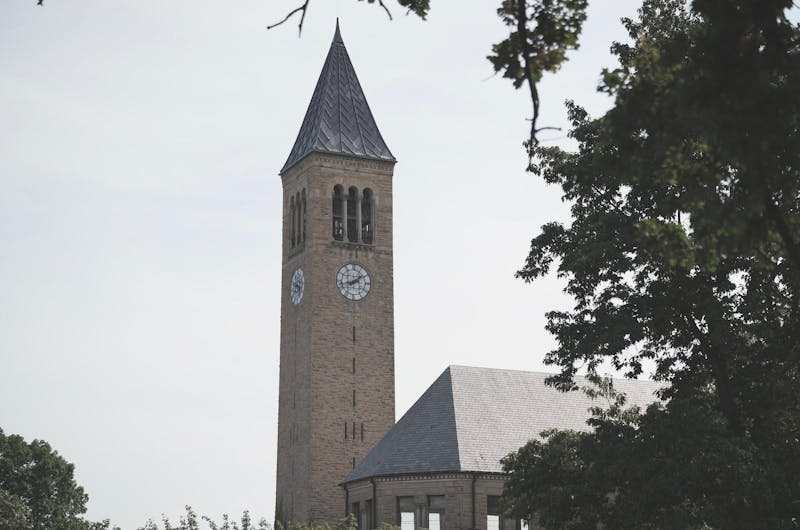The Trump administration and Cornell have reportedly come close to a settlement of as much as $100 million to restore hundreds of millions of dollars in frozen federal funds, according to Bloomberg.
The deal is expected to be announced as soon as next week, according to Bloomberg’s unnamed sources. The reported progress in Cornell’s settlement discussions follows the Trump administration reaching agreements with Columbia, the University of Pennsylvania and Brown.
According to Bloomberg, the agreement is still being finalized and remains subject to change. It remains under discussion, Bloomberg reported, whether the concessions would include a resolution monitor to oversee whether Cornell is reaching the required changes 一 a demand Columbia agreed to with its $221 million deal.
The University declined to comment to The Sun and Bloomberg on the reported progress of discussions between Cornell and the Trump administration.
Funding Freeze
Cornell and several of its peer institutions, including Northwestern and Princeton, have seen significant federal funding freezes by the Trump administration amid active Title VI investigations of Cornell by the U.S. Department of Education.
The New York Times reported in April that the Trump administration had frozen over $1 billion in federal funding for Cornell, based on accounts from two unnamed U.S. officials. Cornell President Michael Kotlikoff told The Sun in early May that the University had seen approximately 120 stop-work orders until that point, along with the termination of grants over political concerns.
In March, the Office for Civil Rights announced the opening of an investigation of Cornell and 44 other universities under Title VI. The OCR explained that the investigations came amid allegations that the universities violated Title VI by working with The Ph.D. Project — which “purports to provide doctoral students with insights into obtaining a Ph.D. and networking opportunities, but limits eligibility based on the race of participants,” according to the OCR.
Cornell was also one of 60 schools sent letters from the U.S. Department of Education in March, warning the universities to “fulfill their obligations under Title VI of the Civil Rights Act to protect Jewish students on campus” or see “enforcement actions.” The March 10 letter was sent to universities that were under investigation for antisemitic discrimination and harassment.
In late October 2024, Patrick Dai ’24, formerly a junior at Cornell, posted violent threats against Jewish students on Greekrank. Dai was later sentenced to 21 months in prison.
Other Ivy Settlements
The three Ivy League universities that have reached settlements agreed to significant policy and financial concessions and have since seen their federal funding restored.
Columbia agreed to a $221 million deal with Trump on July 23. In the settlement, Columbia also agreed to provide data on its admissions process, including students’ race, GPA and standardized test scores to the federal government. Columbia will also share “relevant data” with the U.S. government on its international students and will “strengthen oversight” of its international student population by “assessing applicants’ reasons for wishing to study in the U.S.,” according to the White House.
While Penn did not agree to a financial concession, it announced it would reconcile its policies of transgender inclusion in sports with those of the Trump administration agreement on July 1. Transgender female swimmer Lia Thomas is no longer labeled as the record holder for three events on the Penn Women’s Swimming and Diving website, instead described as previously setting records “under the eligibility rules in effect at the time” at the bottom of the page.
Brown’s struck an agreement with the Trump administration on Wednesday, which includes committing $50 million commitment to Rhode Island workforce development programs over 10 years, adopting the Trump administration’s definition of “male” and “female” for housing and athletics and “tak[ing] steps to improve the campus climate for Jewish students and combat anti-Semitism,” according to the White House.
In June, Cornell announced major cost-cutting measures — including staff reductions, a hiring freeze and program consolidations — in response to severe financial challenges driven by federal funding cuts.
“It is important that every member of this community understands both the scale of the challenges our university faces, and the seriousness of the risks,” top administrators wrote in a June University statement. “While we are confident that we will weather this crisis, we will only do so by working together to make the difficult, but necessary, changes to ensure that Cornell will continue ‘to do the greatest good’ for many years to come.”
Zeinab Faraj is the assistant sports editor on the 143rd editorial board and a member of the class of 2028 in the College of Arts and Sciences. You can reach her at zfaraj@cornellsun.com.
Read More
